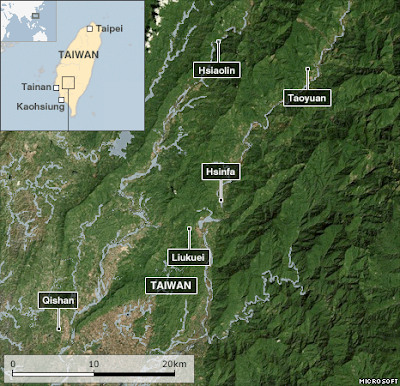 More troops are being drafted in to help the rescue effort
More troops are being drafted in to help the rescue effort More than 390 people are believed to have been buried alive in the Taiwanese village worst affected by a massive mudslide caused by a typhoon.
It is the first time the government has released a firm estimate of the number of people they believe might have been killed in Hsiaolin village.
Thousands of people are still stranded by the worst mudslides and floods.
Last weekend's typhoon caused Taiwan's worst flooding for 50 years, resulting in 117 confirmed deaths so far.
The floods have washed out roads, swept away bridges and sent low-rise buildings crashing into rivers, leaving many mountain villages accessible only by air.
Hundreds of survivors have been airlifted from Hsiaolin village, which was hit by a massive mudslide that covered all but two houses, and thousands more from other settlements in central and southern Taiwan.
But Taiwan's President Ma Ying-jeou has said he expects the number killed to climb to more than 500 people.
Hundreds had been feared dead, but the government had not previously given an estimated overall death toll.
Help on way?
Taiwan's government says it has received offers of help from the international community, including the European Union and the US.
But it has stressed the need for very specific technical assistance - namely giant cargo helicopters that can carry large earth diggers and other machinery into remote mountain areas to help re-open roads.
The government has also requested prefabricated buildings to help house those left homeless by the flooding and supplies of disinfectant, to try to prevent the spread of disease.
Visiting the area earlier this week, President Ma assured anxious relatives that no effort would be spared to find their loved ones, as anger began to rise over the government response.
The families of those stranded and of the hundreds feared dead have urged the government to speed up rescue efforts.
Many have been waiting for days at the rescue operation centre in Qishan for news of relatives missing since the typhoon struck over the weekend.
Critics say the authorities were too slow to realise the magnitude of the disaster. Some of those stranded say they have received no help for days and are short of food and water.
More than 14,000 people have been evacuated by air from th e worst-affected areas. Others have been carried to safety over ravines where bridges have collapsed by soldiers using cables and makeshift ziplines.
e worst-affected areas. Others have been carried to safety over ravines where bridges have collapsed by soldiers using cables and makeshift ziplines.
Military helicopters have been dropping provisions for those still stranded, but poor weather has hampered their work. Soldiers have also been trying to reach remote settlements on foot.
The flooding has destroyed 34 bridges and severed 253 sections of road in Taiwan, Reuters news agency quotes the transportation ministry as saying, with repairs likely to take up to three years in the worst-affected areas.
Officials in the island's south-eastern Taitung county estimated that nearly 3,700 people remained cut off as of Friday morning, the AFP news agency reports, while in central Chiayi county some 9,000 were thought to be stranded.
Some 2,000 people are still to be evacuated in Kaohsiung county, the area worst hit and where the rescue operations in Hsaiolin and other villages have been focused, AFP quotes a county magistrate as saying.
Many of the affected villages are inhabited by aborigines, who farm the mountainous terrain.
Typhoon Morakot, which lashed Taiwan with at least 200cm (80in) of rain last weekend, has caused at least $910m (£550m) in damages to agriculture and infrastructure, Reuters reports.
Reconstruction is expected to cost some $3.65bn (£2.2bn).
news.bbc.co.uk
No comments:
Post a Comment